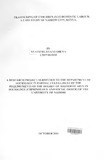| dc.description.abstract | This research project investigated child trafficking into domestic labour in Kenya. The study set to meet one broad objective of determining the push and pull factors that influence the trafficking of children into domestic labour. A sample size of 90 respondents was selected from five Nairobi residential estates. 10 key informants from the area police stations and other organizations dealing with children affairs were also interviewed. The study collected raw data based on a structured questionnaire.
The study established that poverty was the major push factor in trafficking children into domestic labour. Specifically, 75.56 percent respondents of the study indicated that poverty pushed them into domestic labour. The sources of the trafficked children were spread across the country although slightly skewed to ethnic communities around Nairobi as represented by Akamba community (24.4 percent) and Agikuyu community (22.2 percent). The key players in trafficking of children into domestic labour were other relatives (40 percent), parents (28:89 percent) and friends (25.55 percent). The main features and strategies used in trafficking of children into domestic labour were force (42.22 percent), deception (30 percent) and persuasion (17.78 percent).
It was also established that majority of these children trafficked into domestic labour did not attain education levels beyond primary school level as indicated by 95.55 percent. The research findings also established that most (68.9 percent) of these children have both their parents alive. The study concluded that trafficking of children is real and poverty was the root cause of this trafficking of children into domestic labour. The study recommends that organizations dealing with poverty eradication be strengthened. There is also need to put emphasis on family health education to curb early pregnancies and school drop-out rate among the girls.
Other study recommendations include restructuring of the weak judicial system and legal framework to deal with child trafficking, regulation of employment bureaus and enforcement of employment age limit. The study strongly recommends that similar studies be carried out in other cities and major towns in Kenya to compare their findings with the findings of this study. Since this study was based on Nairobi city which is an urban area, there is need to carry out other studies in rural Kenya to ascertain the prevalence of the same vice in these areas and to what extent. | en_US |

